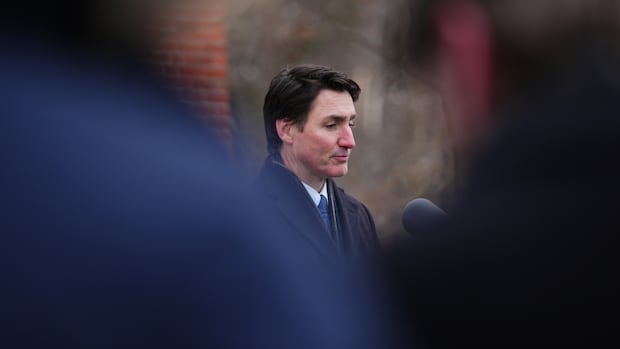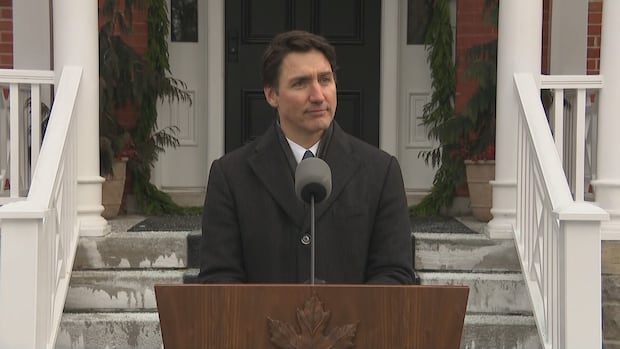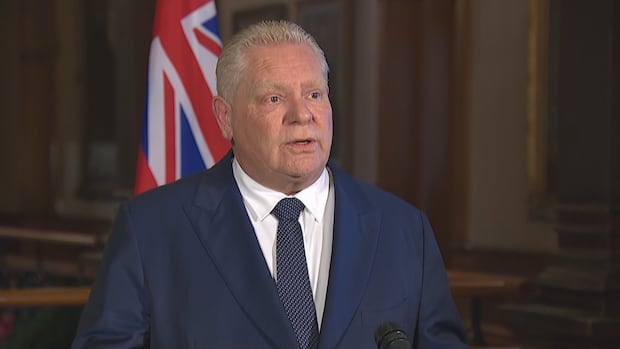Prime Minister Justin Trudeau will soon be stepping down after nearly a decade in office, bowing to mounting political and public pressure to make way for new leadership.
Monday’s announcement, while not surprising, comes at a critical junction for Canada both at home and abroad.
Here are some answers to frequently asked questions about what comes next.
In a major political development, Justin Trudeau has announced he will step down as both prime minister and Liberal Party leader once a replacement is chosen, likely delaying a federal election until the spring. Andrew Chang breaks down what led to this announcement and the implications of proroguing Parliament amid growing tensions with the U.S and president-elect Donald Trump.
Images gathered from Reuters, Getty Images and The Canadian Press.
Why is Trudeau resigning?
Trudeau has been facing pressure from both inside and outside his party for months. A growing number of Liberal parliamentarians had been asking him to move aside and let someone else tackle the Conservative Party, which has a commanding lead in the polls, in the next election.
Trudeau had repeatedly said he planned to stay on as leader, but Chrystia Freeland’s blunt resignation from cabinet on Dec. 16 proved to be too sharp a rebuke of his leadership. Trudeau said Monday he thought about his next steps over the holidays and told his children about his decision over dinner on Sunday night.
“This country deserves a real choice in the next election, and it has become clear to me that if I’m having to fight internal battles, I cannot be the best option in that election,” he said.
Is Trudeau leaving office immediately?
No. Trudeau is still the prime minister and head of the Liberal Party. He said he will step aside once a replacement is chosen for both roles. Meanwhile, Parliament will be prorogued, or suspended, until March 24.
Prime Minister Justin Trudeau said the Liberal government will remain ‘singularly focused’ on protecting Canadian interests and continuing to ‘fight for the economy’ even as the party undergoes a leadership race in the wake of his resignation announcement.
How might Canada respond if the U.S. imposes tariffs?
U.S. president-elect Donald Trump has threatened to impose a 25 per cent tariff on all imports from Canada and Mexico on his first day in office, exactly two weeks from Monday, unless the two countries do more to address border security.
As mentioned, Trudeau is still the prime minister. Cabinet ministers, ambassadors, premiers and other diplomats are still in place, too, so all the leaders who would need to need to respond to Trump still have all their privileges.
The key difference is that, with Parliament now suspended, the federal government can’t pass laws. Ottawa would have to respond to new tariffs another way — like enacting counter-tariffs, for example, since those don’t need to be approved by Parliament to come into effect.
That’s what happened when Trump imposed tariffs on Canadian steel and aluminum products during his first presidency. Back then, the Trudeau government reacted with an order laying out counter-tariffs on U.S. steel and aluminum.
Speaking to reporters on Monday afternoon, Ontario Premier Doug Ford says Justin Trudeau’s number one focus before his resignation should be to create a plan to avoid Donald Trump’s tariff threat.
After Trudeau’s announcement on Monday, Immigration Minister Marc Miller said the current government is still preparing for a second Trump administration.
The “first matter of business” after Trudeau’s announcement “was to jump into a very technical Canada-U.S. cabinet committee meeting talking about the measures that we plan, should we need to respond to the Trump government,” Miller told CBC’s Power & Politics.
Do we have an election date?
No. Because Parliament has been prorogued, opposition parties — who had originally planned a non-confidence motion to bring down Trudeau’s minority government this month — will now have to wait months to do so. If all the opposition parties vote together on the motion, the Liberals will be defeated and a new election would be set.
All said, an election is unlikely to be held before spring.
Parliament is scheduled to start its summer break no later than June 20. If the Liberals are still in power by then, an election would be held as scheduled at the end of October.
If Parliament is suspended, what happens to laws that hadn’t passed yet?
All government bills that hadn’t received royal assent before Monday’s prorogation don’t exist anymore.
To revive those bills, they would have to be reintroduced in a new session of Parliament.
Opposition parties could also choose to bring them back, but there is no guarantee they would do so if they want to defeat the current government. It means some legislation, like proposed changes to the capital gains tax, could be wiped out.
In addition to announcing his resignation as Liberal leader and as prime minister once a new leader is chosen, Justin Trudeau says he has asked the Governor General to prorogue Parliament until March 24. Here’s everything you need to know about what that means — and what happens next.
When will the Liberals choose a new leader?
A date has not been set. Trudeau said Monday he asked the party to start the process of choosing a new leader.
Liberal president Sachit Mehra said he would call a meeting of the party’s national board this week to begin the process and gave no further details.
Could a new leader help the Liberals win the next election?
Polls indicate the Liberals will lose the next election, but the scale of the defeat could be tempered if Trudeau is no longer leader.
“I am confident today’s decision will leave us in a far better place as a party and as candidates … in the next election,” Anthony Housefather, Liberal MP for Quebec’s Mount Royal riding, told Power & Politics.
“I’m glad that we’re going to be able to offer Canadians a different vision, a different face and a type of change.”
Who is in the running to replace Trudeau?
Top Liberals, from heavy hitters to underdogs, will be lining up for the job. Read more about them here.
Could Trudeau be forced out sooner?
Governor General Mary Simon, the personal representative of King Charles, has the ultimate constitutional power in Canada. She could remove Trudeau, in theory, but there is virtually no chance she will.
“The governor general won’t dismiss a prime minister who still holds the confidence of the Commons,” said Philippe Lagasse, a professor and constitutional expert at Ottawa’s Carleton University.






